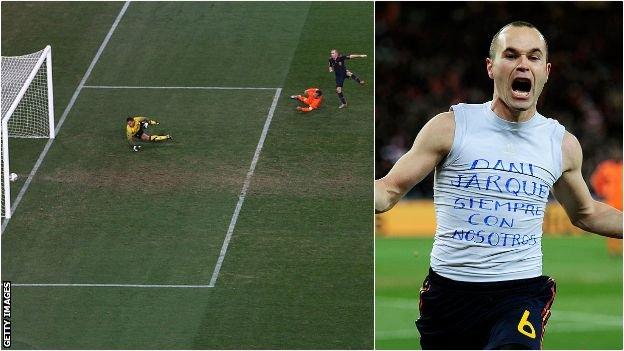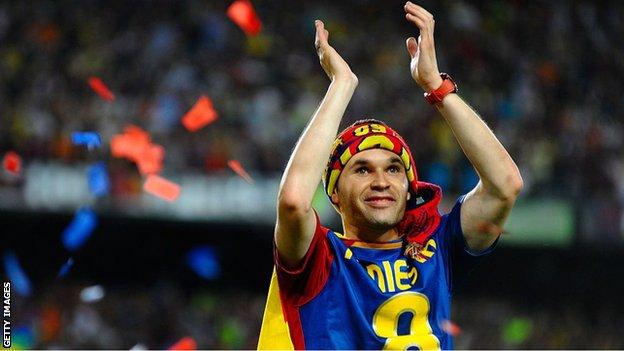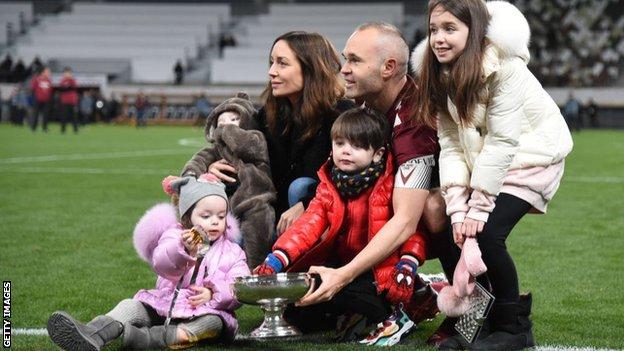There is still a romance to the way Andres Iniesta enjoys a career that, if it were a video game, would have been completed several times over.
The 37-year-old has a trophy haul which reflects his status as one of the great midfielders of his generation – a World Cup and two European Championships with Spain, four Champions Leagues and countless other silverware with Barcelona.
But for the past three years the midfielder has called Japan his home, adding an Emperor’s Cup and Japanese Super Cup with Vissel Kobe. He recently committed to a new deal that will keep him playing until he is almost 40.
Ask Iniesta how he continues to see the seemingly impossible pass, or wriggle out of the tightest situations, and he will take you back three decades and almost 7,000 miles to the instincts honed on the makeshift pitches of his hometown of Fuentealbilla.
“I consider myself an intuitive player who reads the game a few steps ahead,” Iniesta tells BBC Sport. “In the position I play those are maybe my strengths and I try to exploit them as much as possible.
“There are things happening, things I am processing in my head. It’s hard to describe them. They happen in an automatic way – I could have been learning them since I was young or through repetition.
“In football, if you start thinking you can go too slow.”
Iniesta calls it an “essence”. He scored the winner in the 2010 World Cup final and has produced mesmerising moments on the biggest stage, but the foundations are “stuff I used to do when I was 10 years old”.
“Those essences come out in training or matches and I am just led by them,” he explains. “When I was a kid I was basically playing in the streets of my hometown or in the school playing yard, and that environment helps you evolve.
“The connection to that environment and who you are and what type of person you are brings you to being a certain type of player.
“Nowadays kids are maybe practising football in more well-prepared fields. In those environments they need to try to adapt and gain some skills. Each environment helps you get better.”

The gifted kid from the outskirts of Albacete grew up following Michael Laudrup and Pep Guardiola, and was given the chance to hone his raw talent in their shadows when he was exposed to Barcelona’s revered La Masia youth academy at the age of 12, even if he did “cry buckets” on arrival.
He did not know then the influence the latter would have on his career.
Guardiola admired the understated up-and-coming playmaker when captain of the Catalan giants, famously suggesting fellow midfielder Xavi would retire him and “this lad Iniesta is going to retire us all”, before as coach making Iniesta a pivotal part of his all-conquering side.
“Barcelona was like an exam every game and you had to pass that,” says Iniesta. “That’s the base and each time you have to adapt to the environment, mould yourself to the style that is required of you – but always keeping the essence.
“I’ve had different coaches. I started with Louis van Gaal and then there was Guardiola, Luis Enrique and Ernesto Valverde. All coaches teach you something and you can learn something from all coaches. Maybe there are times I played less, but that experience enriched me too.
“It would be hard to point out a coach who has influenced me the most and that’s the same with the players I have played with and learned from. I have been in Barca and Spanish national teams in very good moments and I have been with the world’s best players and I have learned from all of them.”
Iniesta pauses for a moment to consider his answer and then continues: “It’s not only what you have immediately around you, but an opponent, an opponent’s system or style of play. I’ve always thought this motivation to learn is the motor to keep improving.
“You can learn from everything, not only from your immediate surroundings but from everything surrounding your football.”
He highlights the relentless energy of Marcelo Bielsa’s sides and the challenge of breaking down Jose Mourinho’s Real Madrid in El Clasico fixtures.
“I have been lucky to have played a lot of games in my career and you encounter a lot of teams, a lot of proponents,” says Iniesta.
“It is not the same in the different competitions that you play like the Champions League or La Liga or for the national team. English teams or Italian teams are very different. When you played against Marcelo Bielsa’s Chile, that was a particular team.
“Playing against Real Madrid when Mourinho was coaching – or Carlo Ancelotti – are experiences which really enrich you.”
It was Barcelona, though, who inspired coaches around the world to adopt the principles that made them so successful – the tiki-taka, the suffocating press, the focus on technically gifted players at a time when others were scouting for strong, powerful athletes.
“Barca has always been characterised by being a team that wants the ball and wants to keep the ball,” says Iniesta. “In the time of Guardiola, the football itself didn’t change but it was a time where teams were really looking at us and trying to learn.”

Barcelona have not been crowned European champions since 2015, when a certain diminutive Spaniard produced a man-of-the-match performance in a 3-1 win over Juventus, and the club’s current financial struggles mean that glorious evening in Berlin feels like a distant memory.
“I will always see Barcelona in a good way because I still see a different team,” says Iniesta. “Many things have changed since then. Naturally the players are different but there is still an idea, a concept.
“Sometimes there will be good times and sometimes there will be worse times, like it has always been, but personally I don’t like comparing too much.”
Iniesta is reluctant to criticise a club he still holds dear and, once his playing career comes to a close, the Nou Camp is a place he longs to return to.
“Yes, it is something I wish,” he says. “I would like it to happen because more than anything it is the club I spent so many years in.
“You don’t know what will happen in the future, you don’t know in what way I could return or who will be the people in charge at a certain moment.
“So there are many factors which make it hard to see what will really happen, but if you ask me if I would like to, the answer is yes.”
Whether that is in a coaching capacity remains to be seen. There are training centres in Japan bearing his name, the ‘Iniesta’s Methodology’ academies, but the man himself remains unsure of what path he will take.
“Sometimes I would like to coach, sometimes I think my interests go into other directions,” he ponders. “I know I want to stay in football and when I finish as a professional I would like to get a coaching licence, but I don’t know if I will use it in the future.
“There’s nothing where I wake up in the morning and think ‘I want to do this’, so for now I will enjoy playing, training and will see what happens in the future.”

A two-year deal signed in the summer means he will reside in Kobe until at least 2023, a city where Iniesta, his wife Anna and their four children can enjoy a life away from the limelight.
“It is very hard in your home to find a place you feel comfortable or enjoy on a daily basis both professionally and personally,” says Iniesta. “But I think we have found that place in Kobe.
“It was a difficult decision to leave Barcelona but from the beginning the way people treated us has been very, very nice.”
Iniesta is back playing after recovering from a long-term hamstring injury and is focused on bringing more success to Vissel Kobe alongside three other former Barcelona players in defender Thomas Vermaelen, midfielder Sergi Samper and forward Bojan.
“From my side, as long as my body can do it I want to keep competing,” adds Iniesta. “It is important for me to keep that good condition so I can keep enjoying football.
“We’ve won the only two titles in the club’s history and we want to keep trying to make history here this season.
“We are in a good position and the objective is to qualify for the Asian Champions League. In the years I have left, even though it is not easy, I would like to win some more titles.”
BBC



